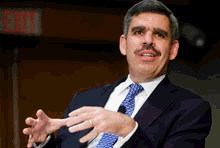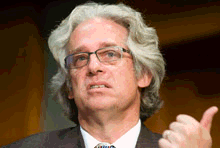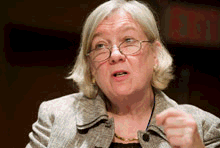
Typical street scene in Santa Ana, El Salvador. (Photo: iStock)
IMF Survey: Forceful Action Needed to Contain Crisis, Panel Agrees
October 14, 2008
- Policymakers unveiling more appropriate steps to deal with crisis
- Measures must be coordinated among governments, explained to public
- Recession appears inevitable, but can be made less severe by right policies
Policymakers must act quickly and forcefully to contain the crisis that has frozen credit markets in most advanced economies and threatens a global recession, financial experts agreed at a seminar during the IMF-World Bank Annual Meetings.

Soros: "Time is of the essence ... Authorities have consistently been behind the curve. Now they have to get ahead of it" (IMF photo)
ANNUAL MEETINGS SEMINARS
Five leading financial market players on a panel to discuss "Turmoil in Global Financial Markets: Prospects and Policies" October 12 also stressed that any policy package should also be coordinated and comprehensive.
"Time is of the essence," said George Soros, chairman of Soros Fund Management. "Right now we are teetering on the brink of panic brought about by the failure of the authorities to anticipate and react. They have consistently been behind the curve. Now they have to get ahead of it."
After more than a year of piecemeal and largely inadequate responses to a credit crisis that started with foreclosures in the U.S. subprime mortgage market, policymakers are unveiling more appropriate steps to deal with a crisis that became more dire following the bankruptcy of investment bank Lehman Brothers, the panel said.
Inject capital
Authorities in the United States, the United Kingdom, and the European Union have just announced plans to inject capital into banking systems weakened by deteriorating asset quality, to remove many of the bad assets from the books of these institutions, to expand the provision of liquidity to the financial system, and to provide guarantees to lenders and depositors.

El-Erian: Policies appeared to be crossing the line from "necessary to necessary and sufficient" (IMF photo)
It was not that U.S. authorities failed to take action, but that their actions were reactive rather than proactive and comprehensive and proved to be "insufficient," according to Mohamed El-Erian, co-chief executive of the asset-management firm PIMCO. Now policies appear to be crossing the line from "necessary to necessary and sufficient." U.S. policymakers have changed their approach from talking about measures to talking about packages and have replaced sequential with simultaneous implementation. The focus has shifted from a U.S.-centric to a global solution.
Talk is not enough, the panelists agreed. Policymakers must take steps that they can explain to the public. And those steps have to be coordinated among governments, cover all of the problems, and be perceived as forceful enough to succeed.

Alexander: Markets are extraordinarily frail and fearful and the short-term risks of a further implosion are high (IMF photo)
Markets are extraordinarily frail and fearful and the short-term risks of a further implosion are high, said Lewis Alexander, chief economist for Citigroup. "Universities can't make their payroll because the money market funds in which they invested their cash tell them they can't get it back.... When those things happen broadly across the economy, you are going to see risk aversion that can drive the economy down quite sharply in the short run," he said.
Extra incentive
Moreover, the threat of a serious global recession overhangs the markets, giving investors extra incentive to pull back and making it more difficult for policies to succeed. The IMF last week, in its World Economic Outlook, predicted virtually no economic growth for advanced economies and a sharp slowdown in developing economies over the next year.
But a serious recession need not ensue, said Christine Cumming, first vice president of the Federal Reserve Bank of New York. "We learned from the 1930s. When demand begins to decline, forceful action can be taken and should be taken." A recession appears to be inevitable, but it can be made less severe by proper countercyclical economic policies. "There's no reason why the worst case has to come about," she said.

Cummings: "We learned from the 1930s. When demand begins to decline, forceful action can and should be taken" (IMF photo)
If policymakers are successful in containing the near-term problems, they will then have to turn their attention to rebuilding the financial system, especially regulation and supervision.
The events that triggered the meltdown in the global financial system were largely the result of a confluence of global trends that encouraged risk-taking in search of higher yield and the spread of innovations such as asset-backed securities and structured credit products. But neither the markets nor regulators fully understood these products, according to Roger Ferguson, chairman of TIAA-CREF and former vice chairman of the U.S. Federal Reserve.
Repayment problems
When repayment problems surfaced among subprime mortgage borrowers in 2007, investors began to shun securities backed by such mortgages. Those fears spread to other structured credit products, because like subprime mortgage-backed securities, they were complex. These innovative securities were designed to spread risk by slicing up the asset pool that supported them into different tranches. Each tranche was meant to represent a different level of repayment likelihood.

Ferguson: Regulation has to get back to basics—creating incentives for managers to behave prudentially (IMF photo)
But because the securities were so complex, and investors began to fear repayment of even the least risky tranches, markets for them dried up quickly, leaving many institutions with large amounts of securities on their books that they could neither sell nor value properly. Banks were wary about lending to one another—or to other institutions—not knowing whether their counterparties had large numbers of such toxic assets on their books. To guard their cash, they confined their interbank lending to very short loans until the failure of Lehman Brothers in September, after which even short-term credit markets largely froze.
One reason policy makers did not take steps that in hindsight they might have was "lack of transparency," said Cummings. There was an "inability to size the problem." She and El-Erian noted that hundreds of billions of dollars of private capital, $60 billion of it from sovereign wealth funds, were injected into the system in late 2007 and early 2008. The amount was "stunning" in comparison to previous crises but insufficient in large part because of the size of the problem, which wasn't at first understood, she said.
`Behave prudentially'
Ferguson said there are no easy answer for the next steps. Essentially, he said, regulation has to get back to basics—creating incentives for managers to behave prudentially and warning them when there are changes they are not taking into consideration. He said authorities also have to continuously assess the amount of leverage in the system and continue to push on quality of information, transparency, and updating of risk-management tools. He also noted that keeping regulators up to date with market changes is important but difficult.
And the financial industry itself will be different, the panelists concluded. The financial sector that emerges after the government actions to clean up the excesses of the system will be smaller, more highly regulated and more heavily capitalized. "It will look much more like a utility," El-Erian said. That's because society finds it unacceptable "to socialize many of the losses while the gains were privatized."
Comments on this article should be sent to imfsurvey@imf.org


